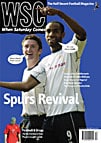England’s qualification for Euro 2004, in all probability delaying the mooted departure of Sven-Göran Eriksson to Stamford Bridge until next summer at the earliest, reduces the urgency of some particularly troubling questions without diminishing their importance: where are all the great English managers? Or even half-decent ones, especially among those with international playing experience? Was there something in the water at Spain 82, Mexico 86 and Italia 90 that ensured an entire generation would struggle to achieve mediocrity?
The debate about the appointment of the Swede – any Swede – is too often treated as a matter of principle, rather than pragmatism. When writers play the patriotic card, branding it “a disgrace” that the Football Association looked abroad to replace Kevin Keegan, they generally finesse the point that alternative candidates were absurdly thin on the ground. As they remain.
If Sir Bobby Robson is discounted, on grounds of age, then the highest-placed English manager to have lifted a major trophy in work in this country is Joe Royle, at Ipswich Town. The last English manager not yet of pensionable age to win a major trophy was Brian Little, whose Villa side won the League Cup in 1996, a season after Everton’s FA Cup win gave Royle his piece of silverware. Little is four games into a new job at Tranmere, after more than 18 months when he was found in the TV studio rather than the dugout.
The situation was marginally better in 2000 in that those triumphs – and others – were less distant. Howard Wilkinson had led Leeds to the league title a mere eight years previously. Roy Hodgson was a serious candidate because of his success abroad, but had unfortunately failed badly at Blackburn in his one major job in his native country and had done so largely because he “lost the dressing room”, a trait that was sure to send a shiver down FA spines so soon after Glenn Hoddle’s reign. But Peter Taylor – whose record since consists of Premiership failure and lower-division success – was the most serious rival candidate. Which says it all, really.
When the FA plumped for Eriksson, Adam Crozier sought to fend off objections to their eminently sensible decision by saying that the Swede’s successor would be English. It is a blessing that the Scot has left what is now Soho Square because Mark Palios, one hopes, will not feel bound by that promise.
David Platt may have a more substantial playing record than Peter Taylor, but has been more like Graham Taylor in his handling of the Under-21s. Steve McClaren worked with Eriksson in his early days but the 11th place Middlesbrough managed last season – the highest by an Englishman yet to manage his country – hardly suggests he is ready for the big one. Alan Curbishley, Steve Bruce and Dave Jones even receive odd mentions, because if the FA are taken at Crozier’s word there are so few candidates out there.
Compared to any other country you care to mention, the English league has always had a uniquely international flavour because of the four-nations-in-one that constitute the United Kingdom. One manager has dominated the Premiership since its inception and he happens to be a Scot. This is a combination of circumstances and luck.
But the number of clubs at the top table of the game has reduced in recent years due to financial concentration. Arsenal, Chelsea and Liverpool looked abroad for qualities which they did not see in English or even British candidates and there must be a chance that we are now locked in a vicious circle.
The sheer value of the top club’s assets, the price of failure for them, will be a strong deterrent against appointing anyone without a sound track record. But how will an Englishman establish a track record if the trophy-winning clubs are increasingly a closed circle? Better to bring in someone who has proved themselves abroad.
We could speculate for the reasons for the unsuccessful generation emerging out of the players of the 1980s – insularity, both mental and, after the Heysel ban, actual. But it matters less how we got here than how we get out of here.
Perhaps Roy Hodgson, who proved himself abroad but returned at a time when many British players were still unreceptive to being asked to change, provides the best example to follow for a young English manager. It is asking a lot – highly qualified coaches such as, remarkably, Sammy Lee are happy to be cogs at large clubs for high salaries rather than taking greater responsibility elsewhere. But otherwise it is hard to see how England’s managerial elite, in the league and with the national team, will be even partially English again.
From WSC 202 December 2003. What was happening this month
